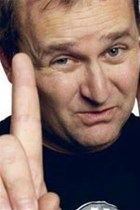In William Shakespeare's The Tempest, the naïve Miranda is stranded on an island with her father Prospero. When, after 12 years, she finally sees other people, she wondrously declares:
"O, wonder!
How many goodly creatures are there here!
How beauteous mankind is! O brave new world,
That has such people in't!".
British author Aldous Huxley next used the phrase 'Brave New World' as the title for his 1932 dystopian sci-fi novel dealing with a world where people's lives, minds and even reproductive cycles were completely controlled for them by the powers that be.
Many Facebookers will no doubt be as ecstatic as Miranda about Graph Search - discovering people, places and foods they didn't know existed.
In stark contrast, there will no doubt also be the Huxleys among us, warning of a world where our online privacy is increasingly for sale to the highest bidder.
Graph Search is basically a personalised search engine based on your Facebook presence (compared to the more anonymous and general Internet-based searching).
Facebook already knows much about you (including but definitely not limited to your hobbies, location, likes, the types of friends you have, bands you listen to, movies you like, restaurants you frequent). It will now be able to use your data in an attempt to help your social searches more often while helping like-minded friends and strangers in their searches.
Tom Stocky, Product Director at Facebook states, "There's really simple things that people want to do - people want to find all the photos they've liked; they want to find all the photos of two particular people; all the photos of their family. They want to find all of their friends who live in a particular city, because they're going to visit there. Those are really hard things to find right now. You have to go to a bunch of different pages; you have to piece all of this stuff together. And now it's easy. You can say what you want and you get the results."
Lars Rasmussen, the project's engineering director sheds some light on the project, "In the past, Facebook's really been primarily about mapping out and staying in touch and communicating with the people you already know in the real world. But now, we're building a product that can also be used to find people that you should know. People that have common interests, people you want to work with".
It's a new phase in the Facebook experience, as Zuckerberg explains, "It's interesting because most people today don't think of Facebook as a place to discover places where they could go eat or things that they could go do. But...with this product, it's just so natural to go and do that".
If you're in marketing and still believe that social media has no gravity for your product or service, the 1990's called, they want their moonbags back.
Zuckerberg clarifies, "There are a few pillars of the Facebook ecosystem. One is Newsfeed. You show up and you could just see all of the stuff that is important, that's happening recently with your friends. Another pillar has been Timeline - each person can share whatever they want with whomever they want on Facebook and your timeline is your place where you can curate everything that you want to show up about you and it's just everything about you in one place. Graph Search is going to be another pillar that's like that".
You could take the point of view that personalised searching is, to paraphrase Austin Powers, "not your bag", but we only need to look at how our Facebook experience changed with the introduction of Newsfeed (where many, if not most, of us now spend most of our time interacting with the platform) to see that things are about to powerfully change in Zuckerbergia.
There are bound to be many bumps along the way, as the project gets applied around the world. Zuckerberg acknowledges the fact that it's an on-going process, "We just view this as a project that we're going to be working on for years and years to come. But as it gets more completed, it's just going to be this amazing resource for a lot of people around the world to use".
Whatever your point of view, we suggest reviewing two basic factors. First, ensure your privacy settings are set up as per your needs. Secondly, you might want to have another look at your stated interests on your profile; do these still represent you completely? If not, refocus your interests, likes and brand pages.
If the idea of meeting (or getting approached by) like-minded people that you've never met before in real life freaks you out, don't worry, this is completely normal.
We are indeed at a phase in human history where people will be getting in touch with each other based on the suggestions of a server in the Zuckerberg hive halfway across the world. We simply have no experience to base this social life on and are no doubt in for interesting times.
Perhaps now, more than ever, you should do the mental exercise of viewing social media as a cocktail party where pockets of friends (and strangers) are involved in on-going conversations.
You simply have to decide whether to talk, listen or leave the party altogether.
It is, after all, a brave new world...
